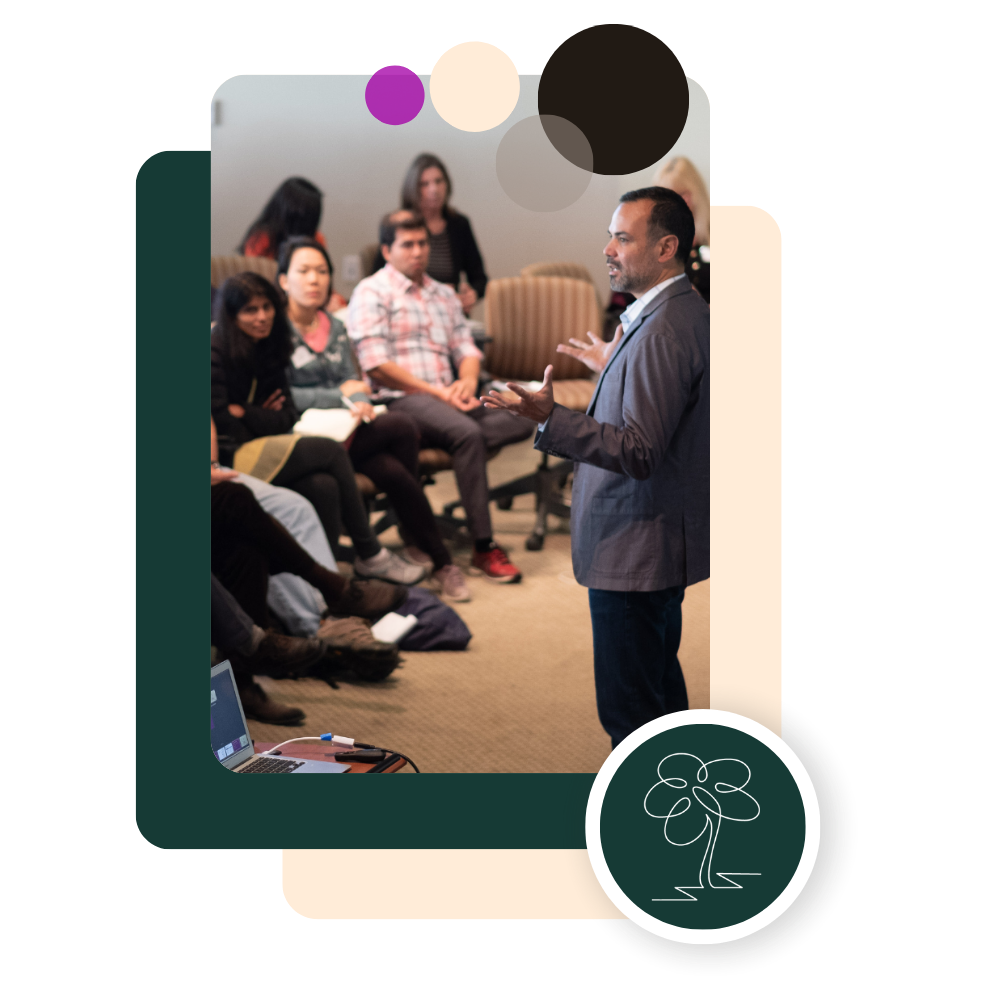Why Facilitators Need Concert-Grade Emotional Intelligence

In the age of AI, do we still need live learning sessions? Honestly, the answer depends on the skill of the facilitator.
Gone are the days when the facilitator’s main job was to share information. Knowledge is so readily available that it’s become overwhelming. Constant. Forgettable.
Instead, people are craving shared, powerful experiences that connect them. Think about the leadership workshop where a heated role-play led to a breakthrough in how two departments collaborate. Or the moment a quiet participant shared a story that shifted the room’s perspective. Those are the sessions people remember.
Facilitation is becoming more like a live concert
One of my favorite analogies is to take a look at how the music industry has evolved. Music artists used to make most of their money on album sales. Touring was often done to promote album sales, with additional revenue being a bonus.
Now, streaming has caused people to want music on-demand for little or no cost.
But a great live show? People line up, pay up, and talk about it for years. (And it’s not just newer pop artists that have this experience; Elton John made nearly $1 billion on his farewell tour).
For facilitators, the message is clear: It’s easy to get information about any given skill. If we want to deliver transformative learning, we have to deliver an emotional and connective experience. It’s the facilitator’s craft that makes the difference.
In this piece, I’ll take a quick dive into creating an emotional experience, drawing on some of the lessons we can learn from the concert experience. Then we’ll dive deeper into how to focus on the competencies you’ll want to develop in your facilitators to deliver on that experience.
5 Useful Lessons Facilitators Can Take from the Concert Model
-
Immerse yourself in their context
Few things lose a crowd faster than getting their reality wrong. (Just ask The Weeknd, who once greeted a California audience with “Hello, Santa Clarita!” instead of “Santa Clara”—two cities hundreds of miles apart, with very different vibes.)
For facilitators, this means doing your homework: know the industry, the organization’s current challenges, and the language they use. Nothing builds trust faster than speaking directly to their lived reality.
-
Use familiarity as a springboard for depth
At a concert, fans beg artists to “play the hits.” Why? Because singing along to something you already know is more satisfying than trying to absorb brand-new material on the spot.
Facilitation works the same way. Have participants learn core concepts through digital modules, pre-work, or AI-driven learning before the live session. Then, when you revisit the topic together, you can go deeper—exploring nuance, application, and real-world challenges—because they’re already familiar with the foundation.
-
Read and respond to the emotional energy
No two audiences are alike. Skilled performers watch for subtle signals in posture, expressions, and energy levels to adjust on the fly.
As a facilitator, track whether your group is energized, skeptical, fatigued, or fully engaged. Then adapt the pacing, tone, or activity level to keep them in the “challenge zone” without tipping into overwhelm or disengagement.
-
Make every audience feel like the only one
The best performers make each stop on the tour feel unique, even when they’ve done the same set hundreds of times. They aren’t tired from their performance yesterday and they aren’t worried about getting on the road again as soon as the show ends.
As a facilitator, show up like this is the most important session you’ll run all year. Treat each group as if the session was designed just for them. Because in that moment, it is.
-
Turn disruptions into connection points
The polished, note-perfect version exists on the album. The concert is for surprise, personality, and shared experience. Some of the most talked-about moments on Taylor Swift’s Eras Tour weren’t flawless performances, but the night she sang for hours in the pouring rain. Instead of breaking the magic, it deepened the audience’s investment.
In facilitation, unexpected tech glitches, schedule changes, or tricky questions can be golden opportunities. Acknowledge the moment, adapt with humor or grace, and use it to bond with participants.
The Big Thing No Facilitator Should Forget
Yes, I realize that concerts are a somewhat more enjoyable experience than a leadership development course (although we should make an effort, right?).
Interestingly, when I’ve shared this concert analogy with peers in L&D, the pushback hasn’t been about the fun factor. It’s about the idea of the facilitator being “the star of the show.” And they’re right: the purpose of learning isn’t for the facilitator to bask in the spotlight or collect applause.
An effective facilitator guides everyone else on a journey of self-discovery. They should enable people to find their own meaning in the content and how changing their approach can transform their job.
But even if the facilitator isn’t the star of the show, the secret to every great rock star’s performance is that they make the audience feel. The best moments in a concert happen when a song connects with something about your life. Or when you have a shared love of a song with your friends or loved ones attending with you. Or perhaps best of all, when you connect with the emotional energy of a group of complete strangers.
In both concerts and the classroom, it’s never really about the performance. It’s always about what the audience feels.
How We Teach Facilitators to Create Memorable Experiences
Here’s how we help facilitators develop the core competencies that delivers a high-value, connective experience:
Emotional Intelligence Embodiment
Great facilitation starts with modeling the skills you want participants to develop. We train facilitators to demonstrate emotional awareness, self-management, and empathy in real time, while giving and receiving feedback with openness and generosity. Using our Perception Box framework, they learn to uncover and reframe limiting narratives—both their own and those that arise in the group—and to step out of unhelpful roles like “expert,” “fixer,” or “pleaser” so they can be fully present to what the moment requires.
Transformational Facilitation
Memorable sessions go beyond knowledge transfer to shift how people think and act. Our approach teaches facilitators to read and respond to group energy as it changes, to guide inquiry with powerful questions, and to weave participant insights into themes that deepen the conversation. They practice navigating discomfort without losing psychological safety, ensuring that even high-stakes moments become catalysts for meaningful change.
Connect Learning to Business Impact
In more than 15 years of our programs, this is one of the areas where we’ve heard the most requests from facilitators. They want to make sure they can draw a straight line from emotional intelligence to organizational results. We help them learn to ground stories, examples, and exercises in real business challenges so the relevance is unmistakable. This way, participants leave with skills they can apply directly to their work, not just abstract concepts.
Grow as a Facilitator
The best facilitators know themselves as well as their craft. Our program builds in reflection on each person’s “why” for stepping into facilitation, along with tools to identify growth edges and refine their unique style. Participants leave with habits that keep them evolving long after the program ends.
Deliver with Excellence
Finally, we teach the mechanics that turn good facilitation into great facilitation: pacing, time management, and the ability to shape a session into a cohesive journey with a clear narrative arc. Facilitators learn to moderate tone and energy to keep engagement high, and to tailor their delivery for different cultures, industries, and business contexts—making each session relevant and resonant for every audience.
The Real Value of the Room
Online modules can teach concepts just fine. And AI can go even further to create more personalized experiences, tapping into vast knowledge and opportunities.
But the room is for what can’t be faked: practice, pressure, genuine connection, and emotion. These are the conditions that set the stage for behavior change. A facilitator who can manage these dynamics becomes more than a trainer, but a strategic asset for the business.
Ready to create the kind of in-person learning people talk about for years?

About the Author: Ryan Heinl, CEO of SIY Global
Ryan Heinl is the CEO of SIY Global and a trailblazer at the intersection of emotional intelligence, neuroscience, and AI-enhanced learning. With over 15 years of experience leading product innovation in the leadership development space, Ryan has scaled multi-million dollar platforms, built award-winning learning solutions, and transitioned entire companies from old-school models to digital-first disruptors. His current mission? To redefine what it means to lead in the age of AI—where human insight is the new power skill. Equal parts strategist and scientist, Ryan brings a research-backed, results-obsessed approach to everything from executive coaching programs to mindfulness-based learning tools. Also: recovering philosopher, relentless rucker, and low-key data nerd.
